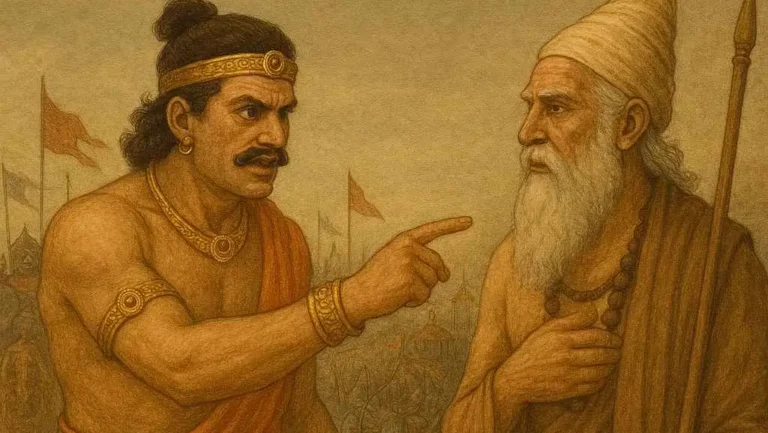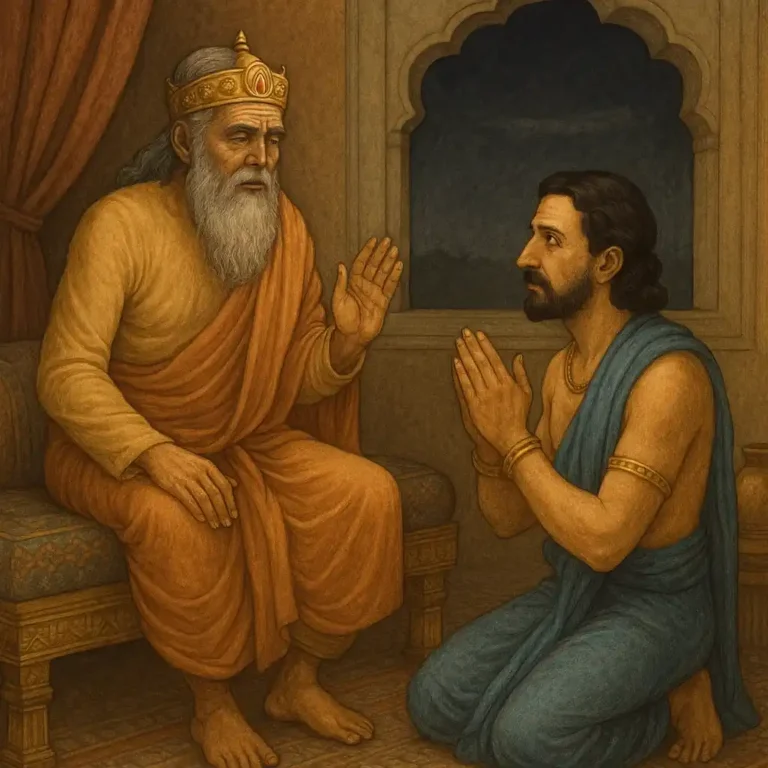This verse will change how you view things: Bhagavad gita
Are you constantly searching for peace but never finding it? The problem might not be the world around you but how you perceive it. When we feel dissatisfied, unsuccessful, or unhappy, we often look for things that validate our emotions and blame external factors instead of working on self-improvement. But what if the key to peace was shifting our focus from blame to self-awareness? This article explores how your perception shapes your emotions and how changing your mindset can bring you the inner peace you’ve been searching for.

Even if you’re unfamiliar with the Gita, this verse will shift your perspective on life.
Have you ever wondered why we see the world the way we do? The Bhagavad Gita holds profound insights into human perception and emotions. While there are 700 verses in the Bhagavad Gita, each packed with wisdom, this particular verse often goes unnoticed. However, understanding it can completely change how you perceive reality.
Bhagavad Gita: Chapter 1, Verse 2
Sanskrit:
सञ्जय उवाच ।
दृष्ट्वा तु पाण्डवानीकं व्यूढं दुर्योधनस्तदा ।
आचार्यमुपसङ्गम्य राजा वचनमब्रवीत् ।। 2।।
Transliteration:
sañjaya uvācha
dṛiṣhṭvā tu pāṇḍavānīkaṁ vyūḍhaṁ duryodhanastadā
āchāryamupasaṅgamya rājā vachanamabravīt
Glossary:
sanjayaḥ uvācha—Sanjay said; dṛiṣhṭvā—on observing; tu—but; pāṇḍava-anīkam—the Pandava army; vyūḍham—standing in a military formation; duryodhanaḥ—King Duryodhan; tadā—then; āchāryam—teacher; upasaṅgamya—approached; rājā—the king; vachanam—words; abravīt—spoke
Translation:
Sanjay said: Upon seeing the Pandava army standing in military formation, King Duryodhan approached his teacher Dronacharya and spoke the following words.
The Deeper Meaning of This Verse
At first glance, this verse appears to be a simple narration of events. However, it holds a powerful lesson about perception, emotions, and how we respond to challenges.
What Do We See vs. What Do We Look At?
There’s a difference between what we see and what we choose to focus on. Seeing is a passive act—light reflects off objects and reaches our eyes. Looking, however, is selective; it is a reflection of our inner state of mind.
Duryodhan saw the Pandava army, but why did he focus on it instead of anything else in the vast battlefield? Because fear dictated his vision. Our emotions shape what we choose to look at:
- If you are filled with lust, you focus on physical appearances.
- If you are angry, the sight of your enemy fuels your rage.
- If you are sad, you notice things that validate your sadness.
- If you are irritated, small inconveniences seem unbearable.
Your mind influences what you notice, reinforcing your emotions. Imagine if you could detach from this cycle. You would no longer be at the mercy of your feelings but would instead experience true inner peace.
Duryodhan’s Choice: Seeking Reassurance or Avoiding Responsibility?
Once Duryodhan saw the enemy army, he had many choices about whom to approach. But whom did he seek out?
- Not Karna, his best friend, who would have said, “My dear friend, I am the most skilled warrior. Don’t doubt me—I can take on the entire army alone.” But when we struggle, we don’t seek reassurance.
- Not Shakuni, his uncle, who would have said, ““My child, there is nothing in this world I cannot scheme. This war has been orchestrated solely to ensure the destruction of your enemies in the most rightful way.” However, in times of distress, we don’t seek a plan to get out of it.
- Not Bhishma, his great-grandfather, who had the power to end the war in a single day and could not die unless he willed it. But Bhishma would have told him, “Look at what you have brought upon yourself and this kingdom. This is the consequence of your arrogance and greed, and now you must face the results of your actions. If only I had not vowed to serve the throne, I would have restrained you myself.” Yet, we often avoid facing harsh truths and self-realization.
- He went to Dronacharya, his teacher—not for guidance, but to taunt him.
This reveals a critical truth: when we are struggling, we often look for someone to blame, rather than seeking solutions. We avoid responsibility for our emotions by projecting them onto external factors—our boss, our family, society, or even fate.
How This Verse Can Change Your Life
When you are not successful, calm, happy, at peace, satisfied, or in control, you tend to focus on things that validate your emotions. Instead of addressing the root cause, you shift the blame onto external factors to avoid the difficult task of self-improvement.
If only we had truly observed rather than selectively looked, understood the real cause of our emotions instead of assigning blame, and focused on self-growth rather than faulting the world, we would have found peace.
So, what do you focus on, and how does it shape your emotions? Are you at peace, or are you endlessly searching for it, believing your dissatisfaction stems from something outside of yourself?


